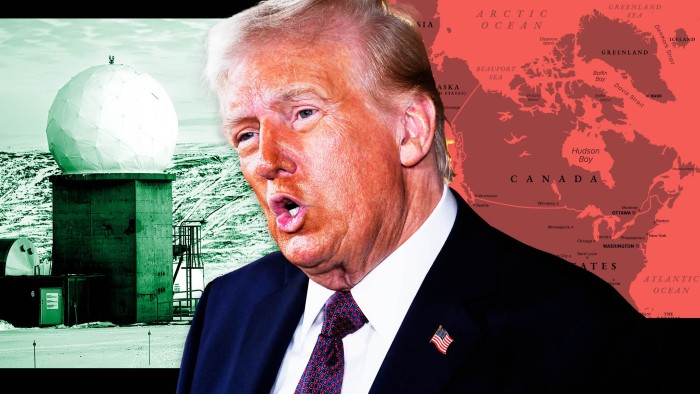US president-elect Donald Trump has refused to rule out military force to take Greenland. But America’s military presence there has long dwarfed the handful of ships, dog sled patrols and single surveillance plane operated by the Arctic island’s security guarantor, Denmark.
Pituffik Space Base, located in the far north of Greenland since the end of the second world war, is home to 200 US military personnel and 450 other forces and contractors from allies, part of Washington’s missile early warning system as well as offering space surveillance and satellite command.
The northernmost US base — only about 1,500km from the North Pole — is the most potent symbol of how vital Greenland is to American security. But its geostrategic importance is only likely to increase as climate change reshapes the Arctic, opening new trading routes close to North America and putting Greenland at the heart of the growing polar tussle between the US, China, and Russia.
Mikkel Runge Olesen, senior researcher at the Danish Institute for International Studies, said: “For the US, the problem is Chinese and Russian interest in the Arctic. The US has started to see the Arctic as a region for geopolitical competition. It’s very important for the US to keep the other great powers out of Greenland.”
When Trump first expressed interest in buying Greenland in 2019, he framed it as like “a large real estate deal” and emphasised the economic aspects of prising it away from Denmark. This time, his focus has changed. “We need Greenland for national security purposes,” he said on Tuesday, while mentioning the need to deter Russian and Chinese ships.
The world’s largest non-continental island may have only 57,000 inhabitants but it has an outsized role in security matters. It sits at the start of both the north-west and north-east passages through the Arctic, which are likely to open up more to commercial shipping through melting, and is close to crucial routes for Russian and other submarines.
Considered part of the North American landmass, Greenland is an autonomous territory of Denmark that has a capital that is closer to Washington DC than Copenhagen.
“Greenland is intimately connected with our security for a lot of reasons and has been visibly since World War II,” John Bolton, the former national security adviser to Trump when he first floated the idea of buying Greenland, told The Free Press recently.
Bolton added: “We know from repeated efforts by the Chinese to extend their influence, they want to become an Arctic power . . . So given Greenland’s geographic proximity to the US . . . it’s obviously a strategic interest.”
The question is whether Trump’s aggressive stance — potentially threatening military action against a Nato ally — helps or hinders US attempts to boost its security in Greenland.
The tone of Denmark’s response has been remarkably emollient, even if it has insisted Greenland is not for sale. Lars Løkke Rasmussen, Denmark’s foreign minister, on Wednesday said he was open to discuss with the US “how we can possibly co-operate even more closely than we already do to ensure that the American ambitions [in the Arctic] are fulfilled”.
Denmark, whose own troop presence on Greenland is limited to an Arctic Command of just 75 people, has tried to demonstrate to the US that it is willing to upgrade its security presence on the island.
It unveiled a $250mn increase in surveillance capabilities in Greenland and the Faroe Islands, another Danish autonomous territory, in 2021. And on Christmas Eve last year, just after Trump first expressed again his desire to control Greenland, Denmark’s defence minister Troels Lund Poulsen said the Nordic country would invest up to $2bn on new ships, drones, dog sled teams, would build up its Arctic Command, and extend an airport runway to take F-35 aircraft on the island.
Still, the challenges involved in defending the vast island were underscored in 2023 when a cruise ship ran aground on the east coast of Greenland and it took four days for the first rescue vessel from the Danish military to reach it.
Olesen of the DIIS said: “It’s a very dicey situation for Denmark . . . But Denmark has been extremely accommodating to the US in Greenland. So it’s puzzling that the US would need to do this because they already have free rein.”

Experts and Greenlandic officials say there have been discussions about building up the US military presence on the Arctic island, possibly even through a second base. Several years ago a current Greenlandic minister said they would be “happy to see more” US defence forces on the island, describing them as “reassuring”.
The push for Greenland to achieve independence from Denmark — likely to feature strongly in elections this April but still a decent way off because of economic challenges — would only increase the need for an outside security guarantor to help defend the island as well as the need for foreign investors.
“We don’t want a new colonial power. But it’s clear that we can’t look after defence ourselves — in money or people terms,” said one Greenlandic official.
Bolton suggested Trump would be wise to “close his mouth” and allow officials in Washington, Copenhagen, and Nuuk to work out a new relationship. But the president-elect seems unlikely to follow that advice, stressing that Denmark should give up Greenland “because we need it for national security”.
Olesen said ultimately it would be for Greenlanders to decide, and that Trump would need not just to threaten but show what he could provide them in terms of security. “What is the US prepared to offer Greenland? Before we see that, it’s hard to know how Greenland will act,” he added.
Cartography by Steven Bernard
Read the full article here




